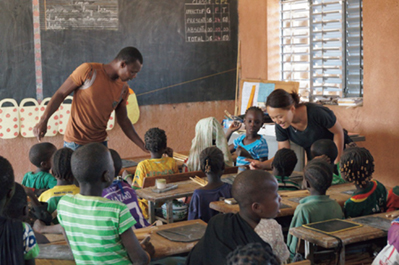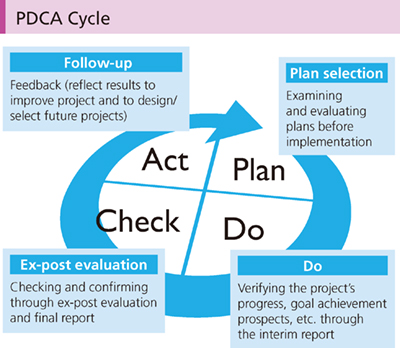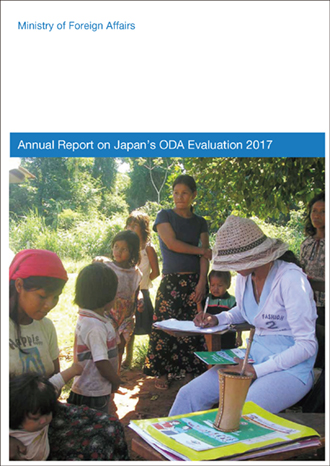Section 3 Efforts for Effective and Appropriate Implementation
Japan's ODA has, over many years, not only contributed to the development and growth of developing countries in various ways but also established firm bonds of friendship and trust between Japan and developing countries, and contributed significantly to improving Japan's standing in the international community, and by extension, to further ensuring the peace and prosperity of Japan. However, it was not without challenges and struggles. There were cases of frauds committed in implementing ODA projects, or they failed in delivering expected outcomes or encountered delays due to unforeseen circumstances. Sometimes ODA projects had unanticipated impact on the environment or local communities, or resulted in accumulated debt. Occasionally the Government of Japan receives feedback that the “visibility of Japanese assistance” is lacking, or that its objective has not been met.
The Government of Japan makes sure that none of these experiences have been in vain, and strives to turn them into lessons for the future. To this end, the government has improved evaluation schemes, endeavored to enhance transparency, and held dialogues with a wide range of stakeholders, including civil society. To ensure that Japan's ODA leads to true prosperity for the people in the developing countries through effective and non-wasteful means, the government has established rigorous criteria that take into account environmental and social considerations, arrangements to prevent fraudulent practices, thorough dialogues and coordination with recipient countries, and detailed project management and follow-up processes. It is incumbent on the Government of Japan to continue to make these diligent efforts ceaselessly, in order to implement more effective and appropriate development cooperation.
1. Implementation of Effective and Efficient Development Cooperation
The Government of Japan is committed to promoting effective and efficient development cooperation to be able to reap maximum effects under a limited budget. For this reason, the government is committed to enhancing unity between the government and implementing agencies as well as strengthening collaboration with relevant actors, reinforcing the PDCA (project formation [Plan], implementation [Do], evaluation and monitoring [Check], and follow-up [Act]) cycle, and engaging in cooperation that draws on the strengths of Japan.
(1) Strengthening the Structure to Implement Development Cooperation
A. The implementation structure of the government

Ms. Ichikawa, a Japan Overseas Cooperation Volunteer (JOCV) (elementary school teacher), conducting a teaching seminar from the children's viewpoints at an elementary school in Ouagadougou, the capital of Burkina Faso (Photo: Miki Urabe)
The International Cooperation Bureau of MOFA plays a central role in the comprehensive planning of policies regarding development cooperation, including ODA, and the coordination of overall policies of the entire government. The Bureau strives to implement ODA effectively by mobilizing the three schemes of assistance - loan aid, grant aid, and technical cooperation - in an integrated manner, as well as coordinating bilateral and multilateral cooperation (cooperation through international organizations). In addition, MOFA shares information and exchange its views with relevant ministries and agencies so that it can reflect their insights and experiences in relevant policies. One of the efforts for strengthening collaboration among the relevant ministries and agencies is the Management Council for Infrastructure Strategy. This Management Council was set up under the Chief Cabinet Secretary for deliberating important matters concerning overseas economic cooperation and for strategically and efficiently implementing Japan's cooperation. Its members include the Deputy Prime Minister/Minister of Finance, the Minister for Internal Affairs and Communications, the Minister for Foreign Affairs, the Minister of Economy, Trade and Industry, and the Minister of Land, Infrastructure, Transport and Tourism. The Government of Japan discusses a variety of themes and promotes development cooperation implemented by the government as a whole, in order to effectively and efficiently carry out development cooperation.
B. Strengthening functions of representation overseas
In order to strengthen policy dialogue with the governments of developing countries, MOFA has established a “Country-based ODA Task Force,” consisting of a Japanese diplomatic mission (Embassy of Japan), overseas offices of JICA and other agencies, in each recipient country of Japan's ODA in principle.(Note 1) The Task Force participates in the decision-making process for ODA policies such as Country Development Cooperation Policies and Rolling Plans after gaining a good understanding of the development needs of the recipient countries. In addition, the Task Force conducts consultations regarding policies with the governments of developing countries. Furthermore, the Task Force works with other donor countries and international organizations in making recommendations on the coordination and review of assistance methods, as well as considering and selecting candidate projects for Japan's ODA.
Japan has also adapted to the increasing momentum for aid coordination* in developing countries, in conformity with moves towards formulating and reviewing the development strategies, sector programs (comprehensive project plans), etc. of the relevant country, as represented by the Poverty Reduction Strategy Paper (PRSP).* Japan has been assigning coordinators for economic cooperation to specific diplomatic missions abroad since FY2006 to collect information and conduct research related to aid coordination. In addition, Japan has established a system to disseminate information on Japan's ODA policies to other countries and make recommendations in the field.
- *Aid coordination
- Aid coordination refers to the mechanisms by which multiple donors share information and work together to formulate aid strategies as well as plan and implement projects, in order to achieve enhanced aid effectiveness. In the past, aid coordination focused on collaboration and coordination among donors on individual projects, while in recent years, approaches have shifted to more comprehensive aid coordination in which donors provide assistance under shared strategies and procedures in accordance with the development policies of the recipient countries, mainly in Sub- Saharan Africa but also in other nations around the world.
- *Poverty Reduction Strategy Paper (PRSP)
- PRSP is a document introduced in 1999 by the World Bank and the IMF as a condition for heavily indebted poor countries (poor countries with enormous debt) to receive debt relief. This action plan for socioeconomic development sets goals every three years in the areas of education, health, food security, and other areas, to ensure that funds released by debt relief are spent on measures to reduce poverty. The document is created by incorporating views of representatives from donor countries, NGOs, research institutes, and the private sector, under the ownership (proactive initiative) of the governments of developing countries.
(2) Efforts for a More Strategic Approach
To adopt a more strategic approach, it is important for MOFA to reinforce the PDCA cycle and take into account more strategic approaches at each phase of the cycle. In policy-making, Japan formulates policies and goals concerning development cooperation while fully recognizing that development cooperation is one of the most important tools of Japan's foreign policy. In the process, Japan thoroughly assesses diverse factors such as the situation around the international community including that of developing countries, the development policies and programs of developing countries, and the strategic importance of the recipient country and the development challenges in relation to Japan. In providing development cooperation, the Government of Japan strives to strengthen coordination between ODA and non-ODA finance/cooperation; effectively combine grants, loans, and technical cooperation, and improve related systems and operate them flexibly. Furthermore, the Government of Japan conducts thorough evaluation at the policy and program/project levels and strives to feed the results back appropriately to the policy-making and program/project implementation processes, not only for improving the effectiveness and efficiency of cooperation but also for fulfilling accountability to the public.
A. Consultations with developing countries
In order to implement more effective development assistance, Japan engages in close policy dialogues with developing countries to share mutual recognition and understanding. Japan implements ODA with emphasis on assistance requested from developing countries, to offer support that encourages development through the recipient country's ownership (own efforts). At the same time, Japan conducts policy consultations with relevant government officials of those countries at a stage prior to receiving a formal request. By doing so, Japan attempts to align those requests with Japan's ODA policy, by gaining a thorough understanding of the development policies and assistance needs of the respective developing countries.
B. Program Approach
The Program Approach is an approach in which objectives for resolving specific development issues (program objectives) are established through consultation and other forms of contact with recipient countries, and concrete ODA projects that are needed to achieve these objectives are implemented.
For example, to achieve the “objective” of reducing the maternal mortality rate in a specific region, “necessary projects,” such as hospital construction using grant aid and midwives training through technical cooperation could be implemented. At present, MOFA is implementing the Program Approach on a pilot basis, and will draw on the experiences and results to strengthen this approach.
C. Country Development Cooperation Policy
A Country Development Cooperation Policy is Japan's country-specific ODA policy formulated on the basis of comprehensive assessment of the development plans and challenges of each ODA recipient country, taking its political, economic and social situations into consideration. The Policy concisely outlines the aim, basic policy and priorities of the development cooperation to each recipient country, and thereby, intends to show a clear direction for the development cooperation implemented through “selection and concentration.” The Policy is to be formulated, in principle, for all countries eligible for ODA, and as of October 2017, Country Development Cooperation Policies (formerly referred to as “Country Assistance Policies”) for 122 countries have been formulated by MOFA.
D. Development Project Accountability Committee
The Development Project Accountability Committee is convened by MOFA to exchange views with independent committee members who have knowledge and experience in the relevant fields, in order to verify validity of ODA projects and enhance the quality and transparency of ODA. The Committee, which has held meetings since 2011, plays a central role in the PDCA cycle. The Committee was established in order to implement ODA projects with greater effectiveness and to enhance their transparency. To this end, prior to carrying out studies for formulating new projects of grant aid, loan aid, and technical cooperation, the Committee conducts exchanges of views regarding the details of the studies between external experts in ODA-related areas and relevant departments of MOFA and JICA, and to reflect past experiences and the perspectives of external experts in the new projects.
E. Enhancement of evaluation

To enhance the transparency of ODA projects and to improve accountability, Japan has so far been working on the thorough implementation of the following measures: (i) enhancing the PDCA cycle; (ii) strengthening the Program Approach; and (iii) reinforcing “visualization.”
With regard to enhancing the PDCA cycle, ongoing efforts include: (i) formulating Country Development Cooperation Policies for all recipient countries of Japan's ODA; (ii) convening the Development Project Accountability Committee; (iii) setting indicators for individual projects; and (iv) strengthening the evaluation mechanism.
Taking into consideration recommendations by the “Project Team on the Evaluation of International Organizations” under the Foreign Affairs Division of the Liberal Democratic Party, the Basic Policy on Economic and Fiscal Management and Reform 2016 (Cabinet Decision) of June 2016 and recommendations by the administrative project review team under the LDP Administrative Reform Promotion Headquarters of December 2016, MOFA established the Division for Evaluation of International Organizations in the Minister's Secretariat in January 2017 with the aim of carrying out objective evaluation of contribution to international organizations and other agencies from a neutral position independent from the policy bureaus.
Under this structure, MOFA has evaluated contribution of more than 140 items in accordance with the following evaluation criteria that are improved based on the feedback and opinions of external experts: (i) outcome and influence of activities in specialized fields of the international organizations or other agencies; (ii) organizational and financial management; (iii) usefulness in Japan's implementation of its diplomatic agenda; (iv) circumstances of Japanese staff and posts, etc.; and (v) ensuring the operation of PDCA cycle in the execution management of Japan's contributions, etc. MOFA announced the result of the evaluation in August 2017, and applied it to the request for FY2018 budget.
In order to implement ODA projects more effectively and efficiently, strengthening of the PDCA cycle at not only the project level but also the policy level is required. To this end, MOFA implements ODA evaluations by third parties, who approach the evaluation from a neutral position. In addition, MOFA also conducts policy evaluations of economic cooperation policies based on the Government Policy Evaluations Act (GPEA).
Regarding third-party evaluations, evaluations are mainly carried out at the policy-level (e.g., country assistance evaluations and priority issue evaluations) and from the development viewpoints based on three evaluation criteria, namely, whether the policies and programs match the dominant ODA policies of Japan and the needs of the aid recipient countries (relevance of the policies), whether the goals that were initially planned have been achieved (effectiveness of the results), and whether an appropriate process was carried out until implementation of the policies (appropriateness of the processes). Moreover, based on the idea that confirmation of how the implementation of said policies and programs affect diplomacy is important in an evaluation, diplomatic viewpoints have been introduced since 2011 as evaluation criteria in addition to the developmental viewpoints. As an example of how Japan's ODA is perceived overseas, in the Opinion Poll on Japan in Ten ASEAN Countries(Note 2) conducted in 2017, close to 90% of the respondents indicated that Japan's ODA has been helpful in the development of their countries.

Annual Report on Japan's ODA Evaluation 2017
Furthermore, the widespread publication of the evaluation results through websites and other means also plays a role in fulfilling the accountability responsibility in the aspects of how ODA is used and what effects it has had.(Note 3)
Meanwhile, JICA conducts evaluations of the respective grant aid, loan aid and technical cooperation projects as well as thematic evaluations on the respective projects. JICA conducts consistent monitoring and evaluations in the pre-implementation, implementation, and post-implementation stages for each project, and has established a consistent evaluation mechanism for these three schemes of assistance. These evaluations are conducted in accordance with the DAC Criteria for Evaluating Development Assistance. Furthermore, ex-post evaluations by third party evaluators (external evaluations) are conducted for projects that exceed a certain cost. JICA also takes steps to enhance impact evaluations,(Note 4) recognizing the importance of quantitatively assessing the effects of its operations.
MOFA takes response measures for the recommendations and lessons drawn from the results of the ODA evaluations, and reflects them in the policy formulation and the implementation of ODA.
MOFA also conducts ex-ante evaluations* on projects exceeding a certain project budget, and ex-post evaluations on pending projects that have not begun as well as incomplete projects*. These evaluations are carried out pursuant to the GPEA.
- *Ex-ante evaluation
- Based on the GPEA and the relevant government ordinances, MOFA conducts ex-ante evaluation on loan aid projects which maximum amount of loan offered through an Exchange of Notes (E/N) is ¥15 billion or more, and on grant aid projects which maximum amount of aid offered through an E/N is ¥1 billion or more.
- *Pending projects/incomplete projects
- “Pending projects” are projects for which the loan agreement has not been signed or loan disbursement has not begun after five years have elapsed following the decision to implement the project. “Incomplete projects” are projects for which loan disbursements have not been completed after ten years have elapsed following the decision to implement the project.
- Note 1: Excluding some countries under the direct management of JICA headquarters.
- Note 2: Results of an opinion poll on Japan commissioned by MOFA and conducted by a public opinion research agency, on 10 ASEAN countries (Brunei, Cambodia, Indonesia, Laos, Malaysia, Myanmar, the Philippines, Singapore, Thailand, and Viet Nam) in March 2017. The poll targeted 300 respondents aged 18 to 59 in each country, and was conducted through a combination of online surveys and partially through face-to-face interviews.
URL: https://www.mofa.go.jp/press/release/press4e_001780.html - Note 3: ODA evaluation: https://www.mofa.go.jp/policy/oda/evaluation/index.html
- Note 4: A method of verifying the effects of development operations using statistical and econometric methodologies.
